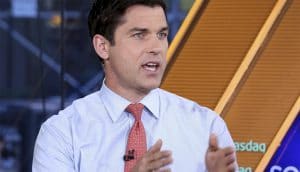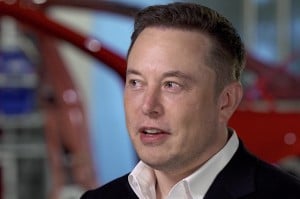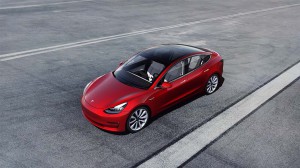
Former NYSE CEO Thomas Farley sharply criticized Tesla’s veracity during an appearance on CNBC Wednesday.
This story contains updated information.
The former head of the New York Stock Exchange took direct aim at Tesla on Wednesday, warning that “false and misleading claims” by the automaker can make it difficult to determine what to believe.
The comments by Thomas Farley, who headed the NYSE from 2014 to 2018, came hours after a transparency website released documents showing federal regulators ordered Tesla and its CEO Elon Musk to stop making what were described as “misleading statements” about the safety of the Model 3 sedan.
“How do you even triage the false and misleading claims that come out of Tesla to decide which ones to take issue with,” Farley said during an appearance on CNBC.
(Advocacy Groups Attack Tesla’s Use of Autopilot — Again)
Tesla has been involved in a number of disputes with the federal government in recent years, including one instance last year that resulted in CEO Elon Musk relinquishing his additional post as chairman. The automaker is also facing a call for a probe of its Autopilot technology by several non-profit groups, including the Center for Auto Safety and Consumer Watchdog.
Former NYSE head Farley raised his concerns the day after website PlainSite released documents obtained under a Freedom of Information Act, or FOIA, request looking into a dispute between Tesla and the National Highway Traffic Safety Administration.
It stems from the routine crash tests NHTSA conducts on vehicles sold in the U.S. Tesla’s Model 3 scored the highest possible results, a five-star rating. In some of the individual tests used to determine a rating, the sedan scored higher any vehicle previously tested. Tesla and Musk followed up with an Oct. 7 blog post claiming the Model 3 “achieves the lowest probability of injury of any vehicle ever tested by NHTSA.”
That brought a quick pushback from the safety agency which first issued a statement asserting that there is “no ‘safest’ vehicle among those vehicles achieving 5-star ratings.” Then, in a letter dated Oct. 17, NHTSA advised Tesla it had made “a number of misleading statements” and called on the automaker to cease-and-desist making claims that the Model 3 was safer than any other vehicle ever tested.
The claims were originally published on the Tesla blog site but CEO Musk subsequently copied the post onto his own, widely followed blog, referencing “The physics of how Tesla achieved best safety of any cars ever tested.”
It was “not the first time” the agency felt Tesla had ignored its guidelines “in a manner that may lead to consumer confusion and give Tesla an unfair market advantage,” according to documents obtained by transparency group PlainSite.
The cease-and-desist request, penned by NHTSA Chief Counsel Jonathan Morrison, demanded that the automaker stop making claims such as its statement that, “there is no safer car in the world than a Tesla.”
(Tesla Stock Tumbles on Word of Latest Loss)
NHTSA has stressed that, under its ratings system, it does not distinguish whether one car with a five-star rating is safer than another with the same rating.
In the letter sent to Tesla, NHTSA said it was referring its concerns about Tesla’s claims to the Federal Trade Commission’s Bureau of Consumer Protection. The FTC did not release any material on possible actions against Tesla, however, despite another FoIA request by PlainSite.
In a response also obtained by PlainSite, Tesla disputed the safety agency’s claim and said it had not tried to mislead consumers.
“Based on the foregoing, we do not see a reason to discontinue use of our safety blog or these statements as long as no other vehicle surpasses the Model 3 Long Range RWD’s Vehicle Safety Score and overall probability of injury,” the company offered in a statement.
The flap over Tesla’s claims marked just one of a number of disputes between the automaker and various government agencies. Tesla previously decided to stop participating in a government probe of a fatal crash involving one of its vehicles operating in Autopilot mode because of a dispute over the process.

Musk clearly expressed his contempt for the Securities and Exchange Commission during a 60 Minutes interview.
Tesla and Musk have faced off with the Securities and Exchange Commission several times, as well. The 47-year-old executive was forced to relinquish his post as chairman of the automaker as a result of his claims to have lined up funding to take Tesla private last year. He faced the prospect of being forced out of the company entirely when the SEC later said he violated terms of their settlement.
Musk, who has derisively dubbed the agency the “Short-sellers Enrichment Commission,” referencing investors betting on a stock’s decline, was able to keep his CEO job but has agreed to run by Tesla lawyers any public statement that might materially impact its stock.
The FTC, meanwhile, has not said whether it will look into the request for a new probe by the Center for Auto Safety and Consumer Watchdog. They issued a joint statement last month criticizing the way Tesla and Musk have promoted the company’s semi-autonomous Autopilot technology.
(Tesla Sets New Production, Sales Record for Q2 — But Could Struggle to Maintain Momentum)
“We feel Tesla violates the laws on deceptive practices, both at the federal and state level,” Jason Levine, the head of the Washington, D.C.-based Center for Auto Safety, said in a telephone interview with TheDetroitBureau.com late last month.

